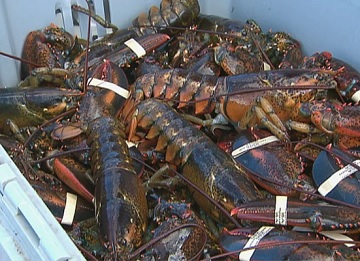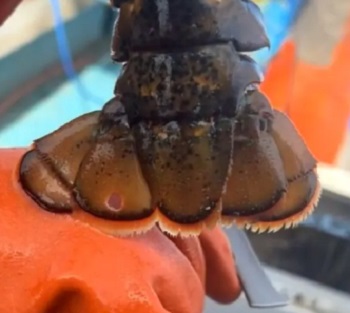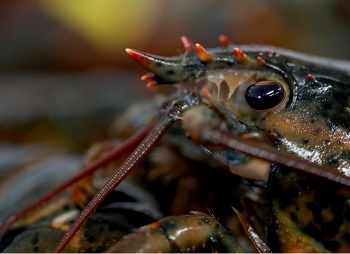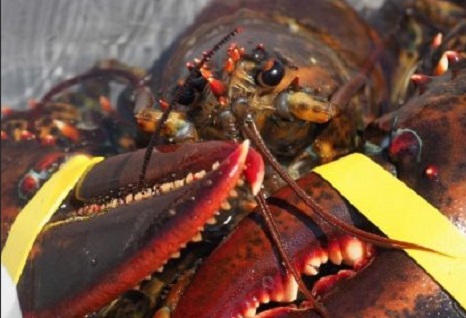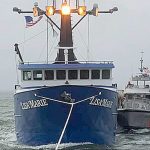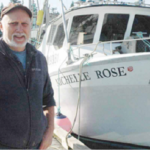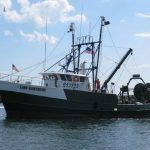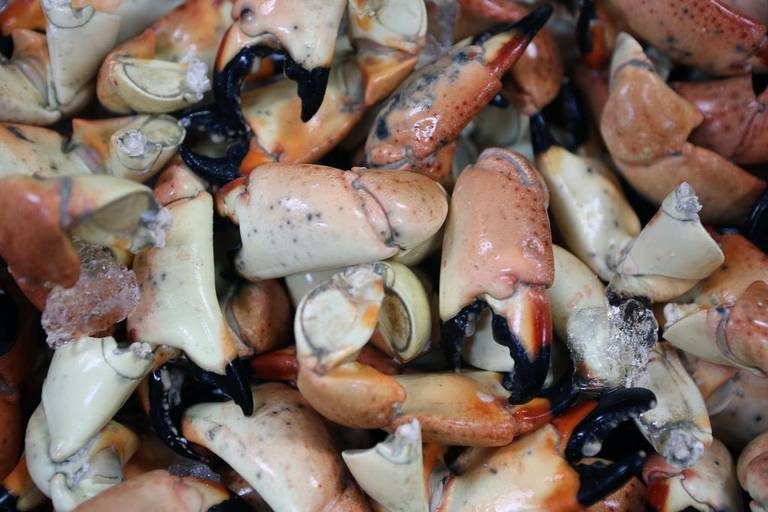Tag Archives: St. Marys Bay
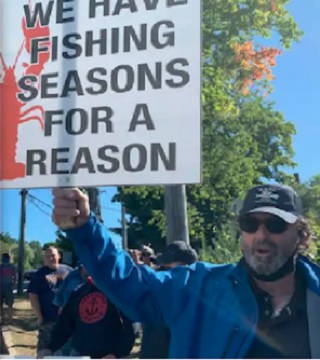
RUBENSTEIN: The endless Maritime lobster war
Nova Scotia has a series of historic treaties with the Mi’kmaq dating back to the 1720s, 150 years before any of the numbered treaties in the rest of Canada. These agreements are known as the Peace and Friendship Treaties and were designed to reduce warfare and to regulate trade between the indigenous and settler populations. While these treaties contained few monetary and no land transfer provisions, they guaranteed hunting, fishing and land-use rights for the descendants of the indigenous signatories. These Peace and Friendship Treaties remain in effect today but were regularly but improperly denied or ignored by the Crown during much of Nova Scotia’s past. Today, those ignoring the treaties and court rulings stemming from them are the Mi’kmaq themselves. >>click to read<< 10:27
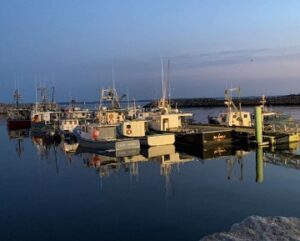
DFO calls for calm in St. Mary’s Bay as enforcement continues
The Department of Fisheries and Oceans calling for safety and patience in St. Mary’s Bay. Tensions have been rising once again due to out of season lobster fishing taking place. In a statement, DFO says they’re committed to a renewed relationship with Indigenous peoples, so they can exercise their Treaty rights to fish. They say many are exercising that right through the Food, Social and Ceremonial fishery, authorized by DFO. But they say it has to comply with the Fisheries Act, and they are seizing gear and laying charges for those who don’t follow the rules. DFO has been getting flack from local commercial fishers and opposition leaders, demanding that they do more to enforce the rules. >>click to read<< 08:43
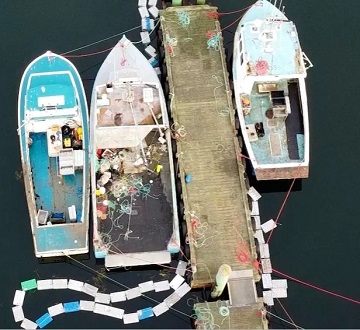
‘Enforce the laws’: N.S. Liberals to feds, province on lobster dispute
As the conflict over Sipekne’katik’s moderate livelihood fishery once again heats up in St. Marys Bay, the provincial Liberal party has split from their federal counterparts. On Tuesday, Nova Scotia Liberal Leader Zach Churchill called for the provincial government to start revoking the licences of any buyers found to be purchasing lobster caught without a licence issued by Fisheries and Oceans Canada (DFO). And he called out the federal government for a lack of enforcement of the Fisheries Act. “We are talking about hundreds of thousands or millions of dollars of lobster being landed illegally. There has to be a disincentive. … DFO also has to enforce the laws of the land which prohibit large-scale poaching.” >>click to read<< 12:34
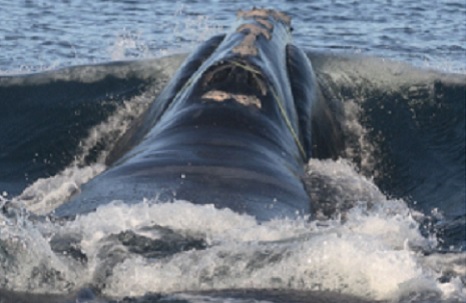
Nova Scotia: Indigenous lobster fishermen not required to observe whale closure
A Department of Fisheries and Oceans fishery closure in Nova Scotia this week to protect endangered North Atlantic Right Whales will not apply to Indigenous lobster fishermen in the area. The department is allowing ceremonial lobster fishing in St. Marys Bay to continue, raising concerns about conservation and fairness. All commercial crab and herring fisheries with unattended gear in the water are being ordered out of St. Marys Bay effective 5 p.m. on Thursday, which is standard practice after sightings. Dan Fleck of the Brazil Rock 33/34 Lobster Association represents commercial fishermen in the area. He said he’s been getting calls from concerned fishermen this week. “I would expect that the rules would be applied fairly and equitably amongst all resource users,” Fleck said. >click to read< 08:01

Restorative justice to be used in resolving charges in ransacking Nova Scotia lobster pound
Restorative justice is being used to help resolve a case involving 25 people accused of ransacking a Nova Scotia lobster pound at the centre of a dispute over Indigenous fishing rights. The Pubnico pound was storing lobster caught by members of the Sipekne’katik First Nation, which angered commercial fishers because the harvest was conducted outside the federally regulated season. Reached for his reaction to Friday’s development, Sipekne’katik Chief Mike Sack expressed surprise and called the referral to restorative justice a “cop out” and a way for the accused to avoid consequences. Video, >click to read< 07:38
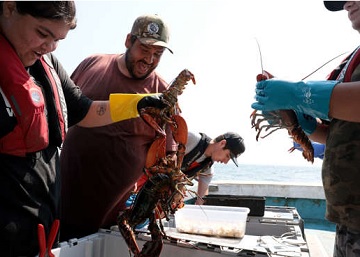
As lobster population booms off Canada, tensions rise between Indigenous and commercial fishermen
Under the close watch of federal officers on surrounding patrol vessels, Robert Sack navigated his old boat toward his clandestine traps in the cold waters that his people have fished for centuries, expecting to be arrested at any moment.,, Each trap had a special tag belonging to their band of the Indigenous Mi’kmaw people, who insist that a 269-year-old treaty grants them the right to fish when and how they want. But the government has rejected their assertion, and officers have seized their traps, confiscated their boats, and even arrested some of their fishermen. >click to read< 07>14
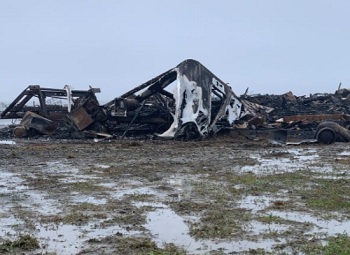
Nova Scotia: Prosecutors add charges for 25 in lobster pound riot
Prosecutors have added more charges against 25 people accused of entering and ransacking a Nova Scotia lobster pound at the centre of a dispute about an Indigenous self-regulated fishery. Crown lawyer Robert Kennedy, however, said in an interview Tuesday the prosecution is willing to discuss “resolutions” for “at least some” of the accused, which would avoid further court proceedings. In January 2021, the RCMP announced that 23 people were facing a charge of break and enter, with eight also charged with mischief, for their roles in the Oct. 14, 2020, incident at the facility in Middle West Pubnico, N.S. >click to read< 14:55
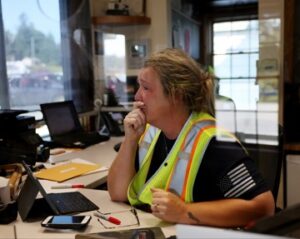
The ‘Lobster Trap’, Part II – Protests and Prayers
When she heard the news, in the middle of her shift selling tickets at the ferry terminal, Cathy Watt broke down in tears. The U.S. government had just ordered the unprecedented closure of a 1,000 square-mile swath of ocean off Maine’s coast to traditional lobster fishing for four months a year, starting in October. It was a crushing consequence of climate change: Warming oceans have hastened an endangered whale’s journey to the brink of extinction, and now Maine fishermen would pay the price. photos, video, part II of a series, >click to read< 09:49 ‘The Lobster Trap’ >click to read<

Indian Brook man charged with allegedly threatening fishery officers in St. Marys Bay
In a news release, RCMP said the fisherman was following a coast guard vessel and came “dangerously close” to the bow. A collision was avoided because of maneuvers made by the captain of the coast guard boat. RCMP said the fisherman then threatened fishery officers who were aboard another boat working in the area. >click to read< 13:04

A year ago violence erupted in the lobster fishery, “moderate livelihood” fishery status unresolved
One year ago, confrontation and violence upended the normally business-like commercial lobster season in St. Mary’s Bay and Lobster Fishing Area 35 in southwest Nova Scotia. Tensions between Indigenous and non-Indigenous fishermen in the bay had erupted in several dangerous boat-ramming incidents.,, But a full year later, as the wheels of justice turn ever so slowly, none of those charged have entered a plea. Before we examine how that happened, it’s worth noting some updates in the troubled fishery. >click to read< 10:07
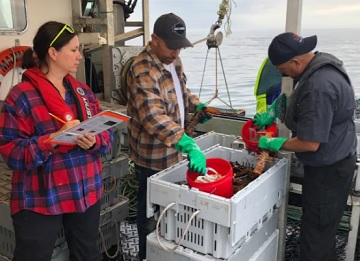
Sipekne’katik First Nation’s lobster study to assess impact of summer and fall fishing
The boat, Mamma Ain’t Happy, is owned by Sipekne’katik First Nation and is fishing under food, social, and ceremonial (FSC) tags. The tags are the licence under which the lobster can legally be fished and allow the band to harvest it for those purposes but not to sell it. After each trip, the catch is brought back to the community for lobster giveaways that feed most of the families in the second-largest Mi’kmaw band in Nova Scotia. But this boat doesn’t just fish for people’s supper. It’s also a data collection site for a study on lobster conservation. >click to read< 13:48
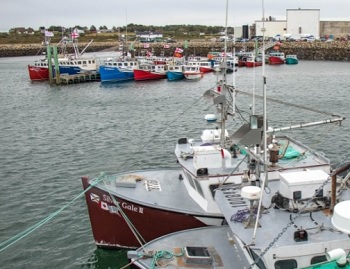
DFO arrests, release 3 connected with last week’s St. Marys Bay lobster shipment seizure
DFO arrested and released three more people in connection with last week’s seizure of a lobster shipment that originated from St. Marys Bay, N.S., where a controversial Mi’kmaw lobster fishery is underway. Last week, DFO said it seized a “significant quantity of lobster,” a vehicle and a trailer in New Brunswick. Two people were arrested and released. The lobsters were released back into the ocean. DFO did not say where or when the three other arrests took place. DFO declined to provide further details because both matters are part of ongoing investigations. >click to read< 22:26

DFO returns patrol boats back to the wharf in Meteghan
After a confusing week for both commercial and aboriginal fishers DFO’s patrol vessels have returned to the wharf in Meteghan. After stories on the move ran in The Chronicle Herald and Globe and Mail, the boats were returned on Sunday. Both commercial and First Nations fishers are glad they are back, though for different reasons. Chief Mike Sack said Friday they wanted a federal presence to prevent a repeat of the violence Sipekne’katik’s fishermen were subject to last fall. Commercial fishermen, meanwhile, want DFO to prevent what they allege is a large scale commercial fishery happening outside their season under the guise of a food, social and ceremonial fishery. “There’s a treaty right but where does it end and where does it begin,” said Nathan Cooke, a buyer who owns Atlantic Canada Seafoods. >click to read< 17:26
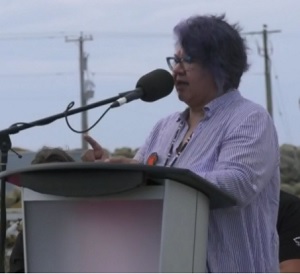
Grand Chief of Assembly of First Nations tells DFO – ‘Stop criminalizing our treaty rights’
The Grand Chief of the Assembly of First Nations is calling for an end to what she calls intimidation over the Sipekne’katik First Nation’s lobster fishery. So far this summer, hundreds of traps have been seized from St. Mary’s Bay and Archibald was on a boat that was boarded by DFO officers Thursday afternoon, who then seized the traps of the fisherman she was with. “Two DFO zodiacs with eight enforcement officers encircled and boarded the boat and later traps were pulled, confiscated and loaded onto a Coast Guard boat,” Video >click to read< 19:50
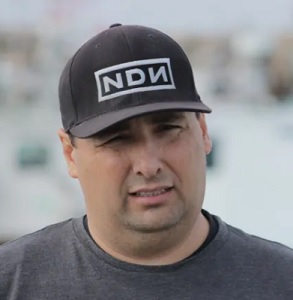
Sipekne’katik First Nation lobster boats cut loose from a wharf in Nova Scotia.
The chief of the Sipekne’katik First Nation, Mike Sack, issued a statement saying the boats were cast adrift from their berths in Weymouth North, N.S., with the “intent to cause damage and intimidate the community.” Sack says the boats were ready to take part in the band’s food, social and ceremonial lobster fishery, which is regulated by federal rules but is not limited to a particular season. >click to read< 17:53
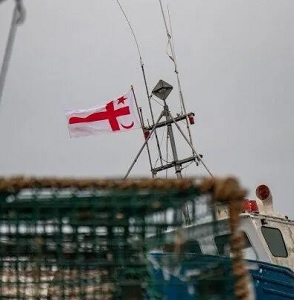
The Sipekne’katik First Nation has indefinitely postponed the start of a communal lobster fishery
The band said it was concerned for the safety of its fishermen and lacked resources to launch the fishery in St. Marys Bay. “The reality is that we would need to provide our own security and police our own gear getting seized and it feels like a costly prospect for our community after all that we have lost,” Chief Mike Sack said in a news release. The decision to postpone came following an emergency meeting of fishermen at Sipekne’katik on Wednesday morning. >click to read< 14:06
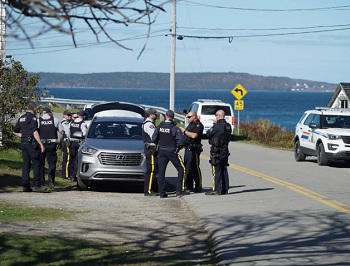
As tensions rose during N.S. fisheries dispute, province balked at paying for extra RCMP
The Mounties have faced scrutiny for their handling of the tensions that followed the launch in September of Sipekne’katik First Nation’s self regulated fishery in St. Marys Bay. Critics included federal Indigenous Services Minister Marc Miller who said the force should have done more to protect Mi’kmaw harvesters,,, It’s unclear what impact, if any, the financial approvals had on the RCMP’s staffing plans. “The number and type of RCMP resources that were deployed was based on operational needs,” Cpl. Chris Marshall, an RCMP spokesperson, said in an email. “In order to protect officer and public safety, we don’t discuss our operations, tactics and resources.” >click to read< 07:55
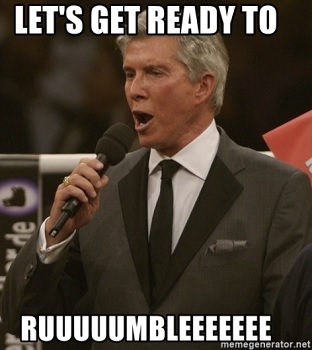
Ottawa, Mi’kmaq community on collision course over plan for second lobster season
The federal fisheries minister said today that enforcement officers will be in place in St. Mary’s Bay to “uphold the Fisheries Act” if Sipekne’katik fishers harvest lobster beginning on June 1. Bernadette Jordan’s comment came shortly before Chief Mike Sack held a news conference to say his band will operate a five-month season that will occur outside of the commercial season. Sack says the plan envisions 15 to 20 boats setting 1,500 traps, with a midsummer closure during the moulting and reproduction season and its own enforcement officials. >click to read< 14:18
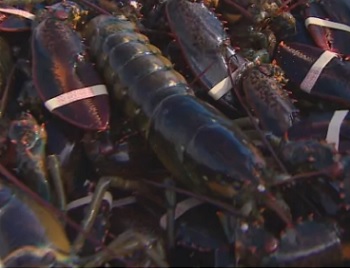
Conserving lobster stocks: Lobster landings data released by DFO show complex picture
Both Mi’kmaw fishers and people who work in the commercial fishing industry say conservation is a key concern. Some in the commercial fishing industry have pointed to declining lobster catches as evidence of potential harm to the fishery. The Bay of Fundy Inshore Fishermen’s Association has said it has concerns about the amount of lobster being landed in St. Marys Bay, which it says has declined 68 per cent since 2016. Fisheries and Oceans Canada released data showing a decline from the record highs in 2015-16. However, an examination of the 18 years of data shows a nuanced picture. >click to read< 08:10
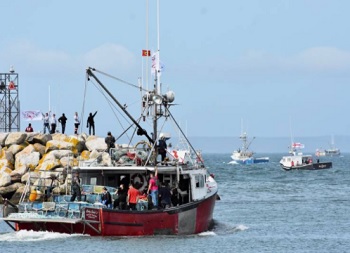
Failed policies, decisions on the fly: How the moderate livelihood fishery file blew up
Documents obtained through a freedom of information request show the federal Fisheries Department knew that 21 years of kicking the moderate livelihood issue down the election cycle had resulted in there being little rule of law on St. Mary’s Bay. The feds knew that the bay had become a pressure cooker as two communities were pitted against one another over a limited resource. When the top blew off, they turned to coming up with new policy on the fly while seeking a daily scorecard on evolving public opinion. “This is about a culture (in Ottawa) that would rather avoid any conflict at all,” said Thomas Isaac, an aboriginal rights lawyer who has served as British Columbia’s chief treaty negotiator,,,>click to read< 13:49
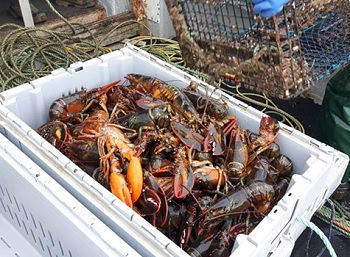
Livelihood lobster fishing cast adrift: How DFO’s inaction has history repeating itself
Its resources are in high demand by Indigenous and non-Indigenous fishers alike, and for more than 20 years it has seen tensions between the two communities turn from boil to simmer, to boil again. Recently, it made headlines internationally. Tensions in the area erupted into violence and destruction after the Sipekne’katik First Nation launched its own, self-regulated fishery, outside of the commercial season, based on Mi’kmaq treaty rights. To Alex McDonald, one of the oldest still-fishing Indigenous lobster boat captains of the area, the chaos this year was nothing new. >click to read< 08:14
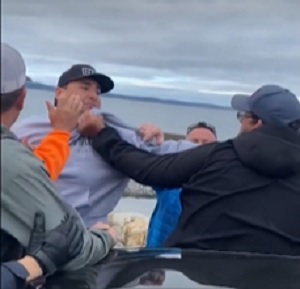
The Nova Scotia lobster fishery fight – Year in Review
Sept. 17, the Sipekne’katik First Nation launched a self-regulated lobster fishery outside the federally-regulated commercial fishing season. On Sept. 18, two people are arrested on assault charges following confrontations between Mi’kmaq and non-Indigenous fishers on the wharf of the self-regulated fishery in Weymouth, N.S. This was the beginning of a showdown that would spark solidarity rallies across the country. “We all have Indigenous blood. We always worked side by side. The Acadians are not racist. We know they (Indigenous fishers) have rights, but we can’t respect what’s happening in St. Mary’s Bay. Video, >click to read< 08:29
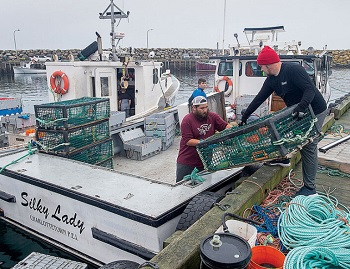
Why a clash over crustaceans is roiling Canada
It’s a battle about jobs and livelihoods, ethnic identities and cultures, and deeply embedded family and social traditions. Yet it’s also a clash about something else: the future of what was once one of the most fecund fisheries in the world. Both sides recognize they have a shared interest in keeping the industry thriving in a place that has been traumatized by declining fish stocks. This is especially true at a time when the pandemic has temporarily cut off customers for the area’s succulent crustaceans. >click to read< 19:05
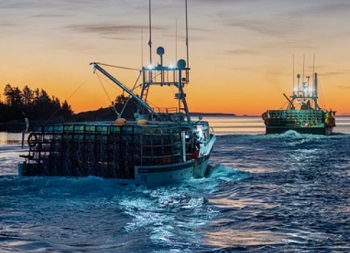
‘There’s Death Threats’: Indigenous Fishers Nervous as Nova Scotia’s Commercial Lobster Season Opens
Some Mi’kmaq have fished alongside commercial fishermen on these wharves for years but this year, after violence erupted in the past few months, they’re now divided largely by race—the white Acadian fishermen at Meteghan, and the Mi’kmaq at Saulnierville, with each flying their own flags. A court injunction, sought by the Mi’kmaq, has further separated the two groups, in an effort to prevent any more aggression and harassment towards band members on the Saulnierville wharf and on the water as they continue to fish until Dec. 17, the end of their moderate livelihood plan. The commercial inshore lobster fishery, expected to launch later this week, runs until the end of May. >click to read< 20:37






